Given the exciting, bombastic noise of many sci-fi games today, Citizen Sleeper contrasts this by exploring equally meaningful ideas through smaller stakes. After their well-received first title, In Other Waters, developer Jump Over The Age dives headfirst into cyberpunk. Not only does this cover new storytelling ground for this team, but their approach to tabletop role-playing (TTRPG) also grabs hold of you from beginning to end.
You take on the role of a Sleeper: a human consciousness mapped onto a synthetic body. Regardless of what character class you select, you're always sentient "property" of your corporate creators, Essen-Arp. Having successfully stowed away on a transport ship, you barely make the trip to Erlin's Eye, a worn-down space station on the edge of a star system. Only the beginning of your problems. On top of trying to survive aboard The Eye, you'll have to navigate the various factions and personalities at play in order to eke out a meaningful future.
Amongst The Stars
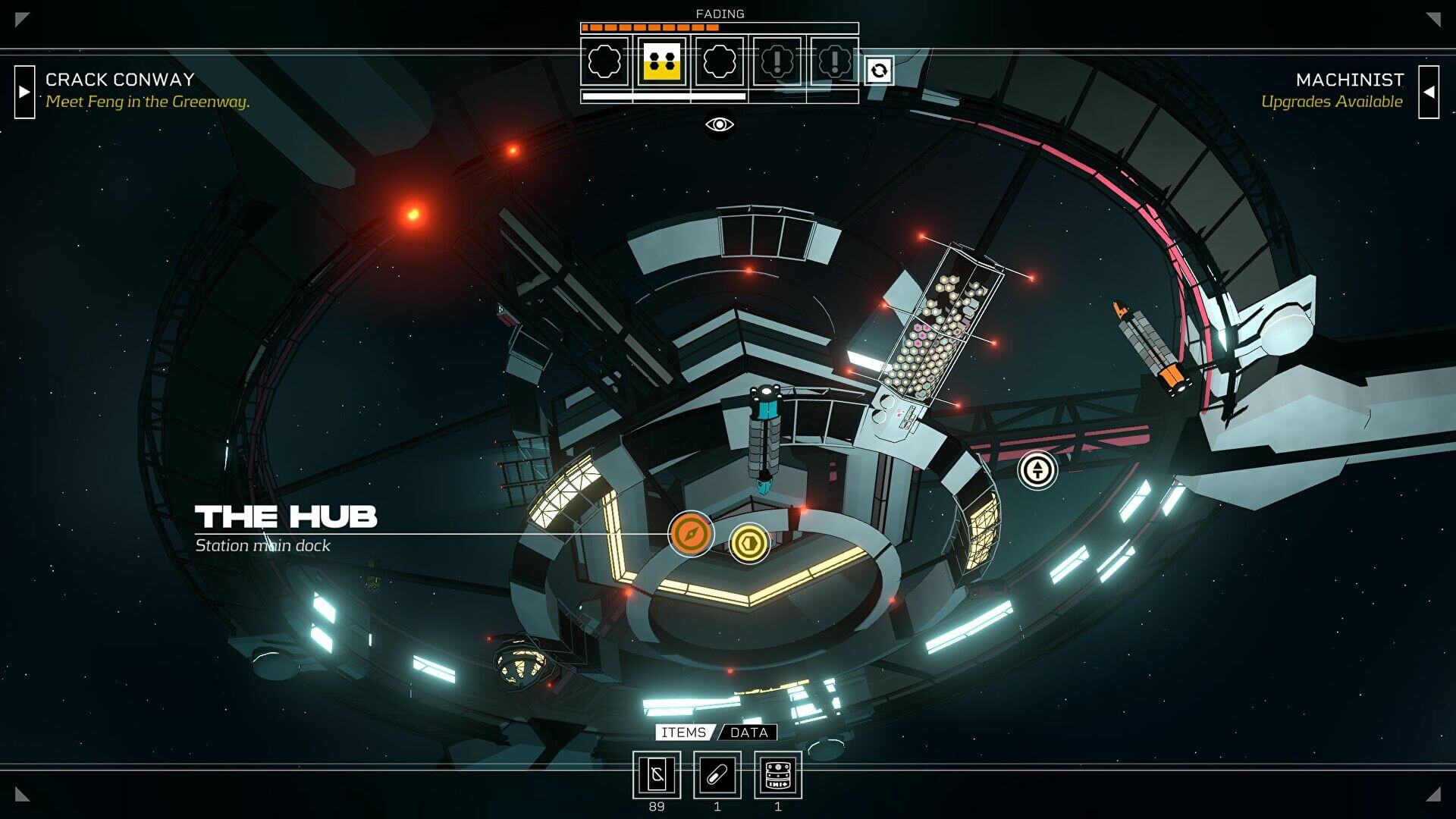
Reaching that inevitable goal of freedom still means you have to wrestle with your past. The "planned obsolescence" baked into this artificial body demands you buy quality meds, plus earn your keep. It starts off relatively simple: help a junker slice up parts to earn some cryo (in-game currency). He's willing to keep his silence and give you an empty shipping container in exchange for honest work.
This introduction also eases you into Sleeper's tabletop systems. Everything runs on action dice, ticking clocks, and drives. The start of every cycle nets you a fresh round of die varying from 1 (greatest potential for a negative outcome) to 6 (guaranteed success roll). As more and more options open up across this spinning ring, where you want to invest the allotted dice become part of your routine. On top of that, there are various risk factors when making decisions. Will you take the safer route with some middling dice or focus on riskier actions that can net better rewards (improved progress for a mission, more cryo, and so on).
Going beyond the day-to-day RPG life simulation, your Sleeper is able to perceive the world in a fundamentally different way. There's another digital world beneath the hustle of shift work or purchasing food that you can filter through; it's a greyed-out world filled with information nodes and scanlines. Rather than risking mediocre die on laborious tasks, it might match the value number required to hack a terminal and acquire faction information. The real and digital feel is so naturally embedded into the game design.
You Spin Me Right Round
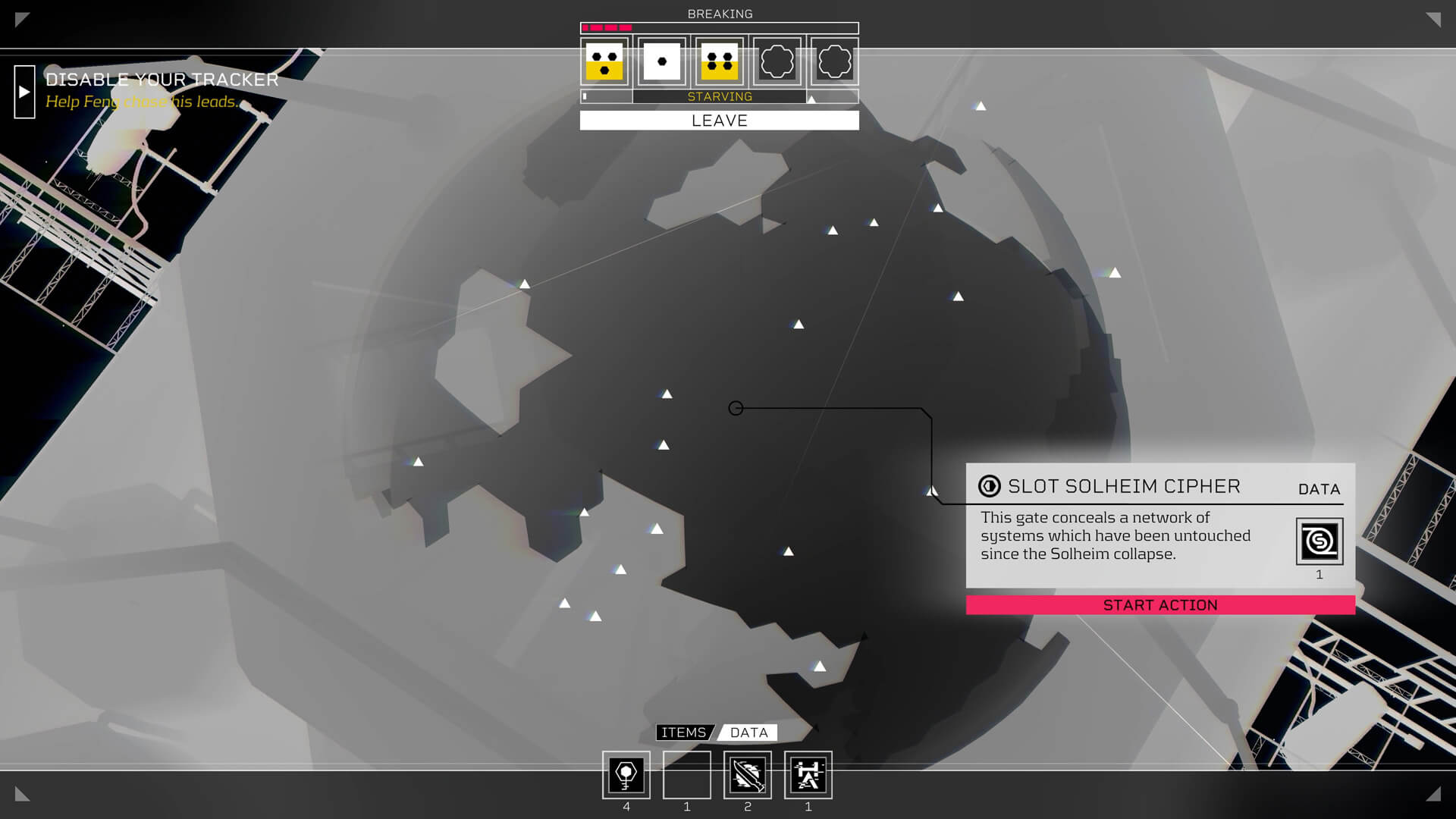
It's strange to have such a spirited tone with what's a basic concept to follow. What's so ensorcelling about having a godlike view of this station, rotating it to various UI markers, making dice rolls, and the occasional dialogue choices? Well, beyond the great writing, there's something so palpable about inhabiting a struggling... entity in these conditions. You never get to see your Sleeper maneuver through Elvin's Eye, but the flavorful text dumps describing this world and the daily struggle fire your imagination on all cylinders. The hooks are extremely subtle at first, but eventually, you're this dice-rolling maven planning out where to invest your die and money several days in advance.
Of course, it's not without flaws. The ruleset seems abstruse at the beginning due to a barebones tutorial. Admittedly, I'm not the best versed on this sub-genre overall, but I feel like something was missing from that beginning. The UX/UI on console is also quite finicky. As it relates to the basic tutorial, I initially thought I can only rotate Elvin's Eye with the control sticks. That option feels unfinished compared to the triggers and D-pad combo. Those little usability issues can get under my skin.
The one overarching game design fault funnels back to this: it could've had more bite towards the end. One of Sleeper's genius decisions is the "Condition Meter," which determines how many action dice you're afforded per cycle (5 max). During the first two-thirds, this shadow hovering over me felt pervasive and uncomfortable. It's a great example of "ludonarrative harmony," given that discomfort palpably matches your Sleeper's dire straits. Once you level up a specific character trait, this becomes a non-issue; similarly, the ease of acquiring money towards the final half reduces its impact.
Since it's more interested in flexibility over complexity, Sleeper's TTRPG structure might not fully connect with ardent fans; that said, there's a real earnestness in its design that consistently drew me in. After the early hurdles, I felt subsumed in that struggle with chance to continue onward. It's also complemented by the incredible pacing between the visual novel and tabletop aspects. Sure, its harder edges eventually get sanded down, but enough excitement was always there to absorb it in two sittings.
Narrative Backbone
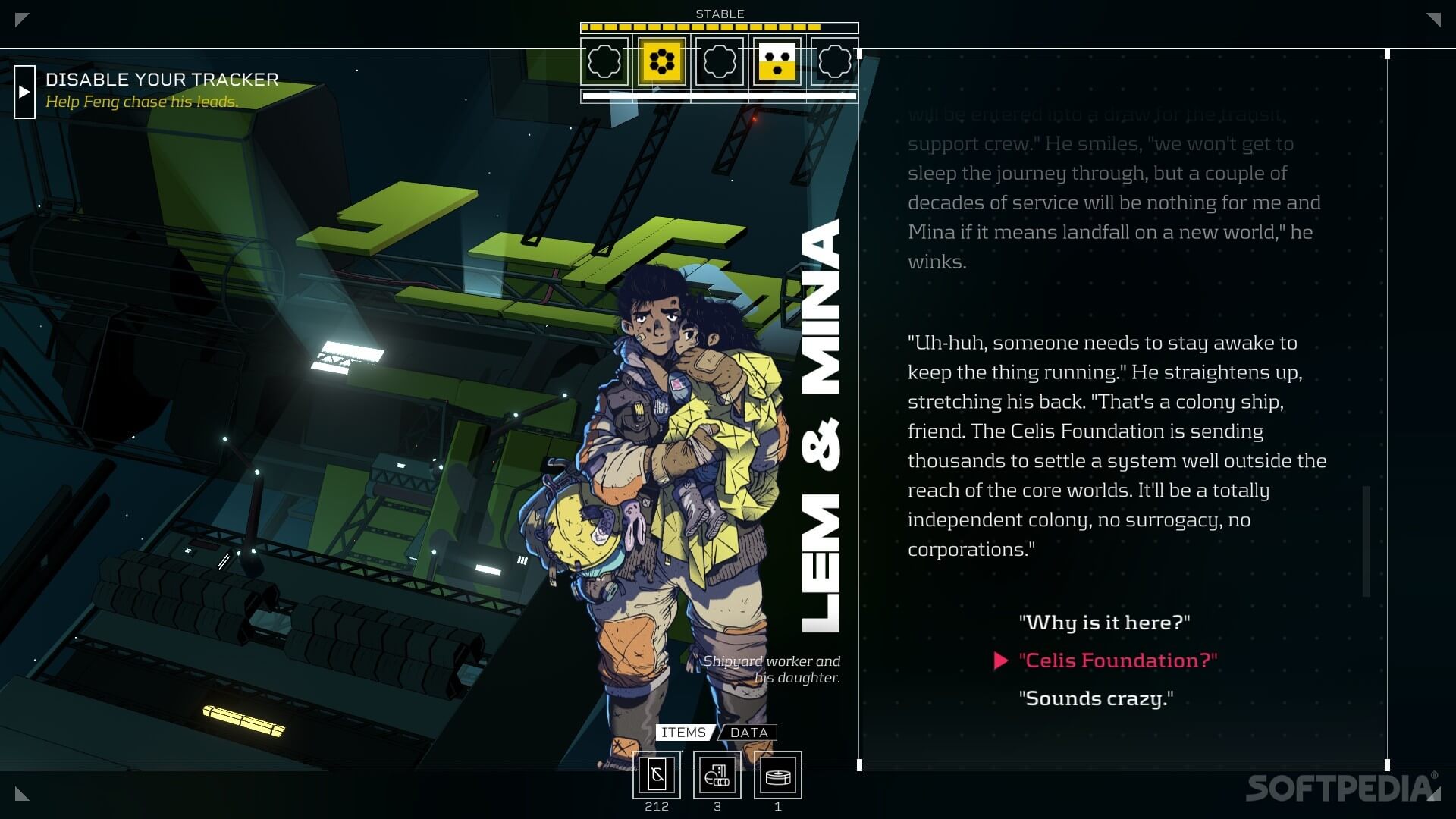
Another critical reason for maintaining engagement comes from the great writing. From page one, its sleek prose succeeds by succinctly communicating the foreign struggles your Sleeper has with this cybernetic suit. Even with a roster of mostly-affable side characters, there's always a slight distance between both parties thanks to your situation. That coldness also informs what's experienced in the digital world. The way Gareth Damian Martin communicates that through world-building and action has a way of demanding anyone's full attention.
Similar to a previous critique, the biggest storytelling flaw would come back to a lack of bite. Given the cybernetic dystopian world and corporations run amok, it's rather convenient that most side characters are ultimately endearing; moreover, the villains are treated more like disposable distractions from your day-to-day work. In its defense, I think the panoply of kinder individuals feels reflective of your Sleeper's earnestness. Its warmer atmosphere in such a cold, cynical world feels like its own reward - in a sense.
When viewing from a macro level, Martin's writing has a tendency to spin its wheels with character motivation and unimpressive socio-political musings. But it's the micro qualities that stack atop each other that thoroughly impressed me. The flashes of excitement I had greeting a new character, the potent prose, and the energetic pacing between Sleeper's physical and digital lives kept me hooked. Simply learning about the ancien regime of The Eye made me hungry to learn more. Whatever specific critiques I do have never surmounted my interest to read Martin's next paragraph.
A Different Cybernetic Tone
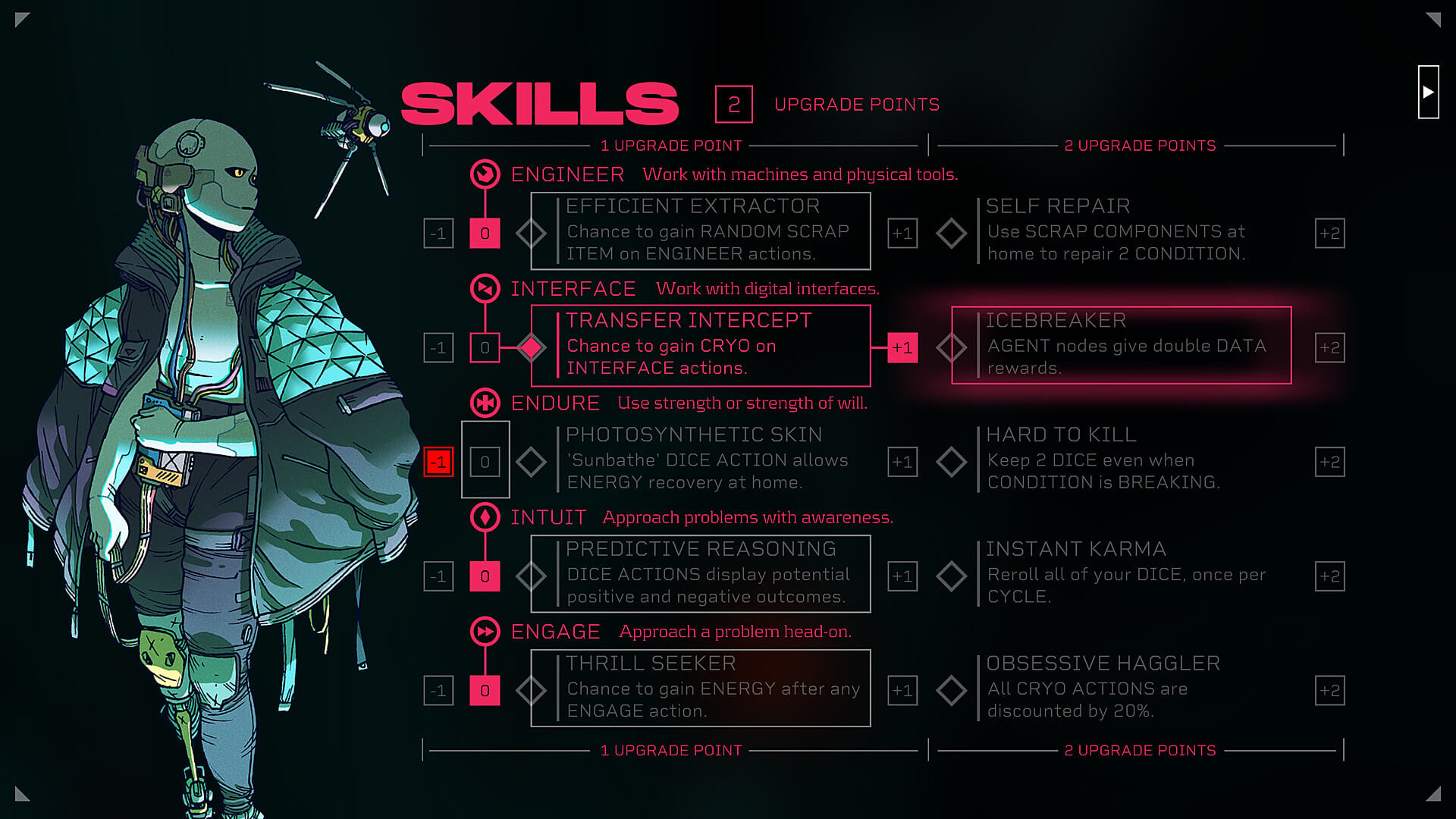
Although the words breathe life into them, Guillaume Singelin's great character artwork adds vivid color within the lines. Even though you'll only see a select amount of 2D stills, the range of emotion and subtlety inscribed into them goes further than several big-budget RPGs. Doing more with less also works for the overworld's aesthetic too. From the ticking clocks to the UI information, Sleeper's sleek look visually communicates all of the necessary info at a moment's glance. As a nice bonus, I didn't experience any rough technical mishaps either.
That visual texture is wholly unified with its sound as well. Amos Roddy's electronic-heavy soundtrack ranks among my favorites of 2022. Whether capturing a more exciting beat (like Prismatic Lens) or letting you drink in the ambiance, there's something so inspiring about these tracks. Roddy's pellucid voice is a great substitute for each character without one. While not as impressive, the sound design does a commendable job of aurally communicating the disparate atmosphere between the physical and digital world.
Given the tendency of Unity games to be utterly bad, it's great when examples like Sleeper come along to challenge that expectation. Jump Over The Age understand the limitations of this engine and the modest $20 price range, but find effective measures around it. Beyond its price and respectable eight-hour runtime, it feels like a wholly complete experience, with even greater exploratory potential after the credits roll.
Shouldn't Sleep On This One | Final Thoughts
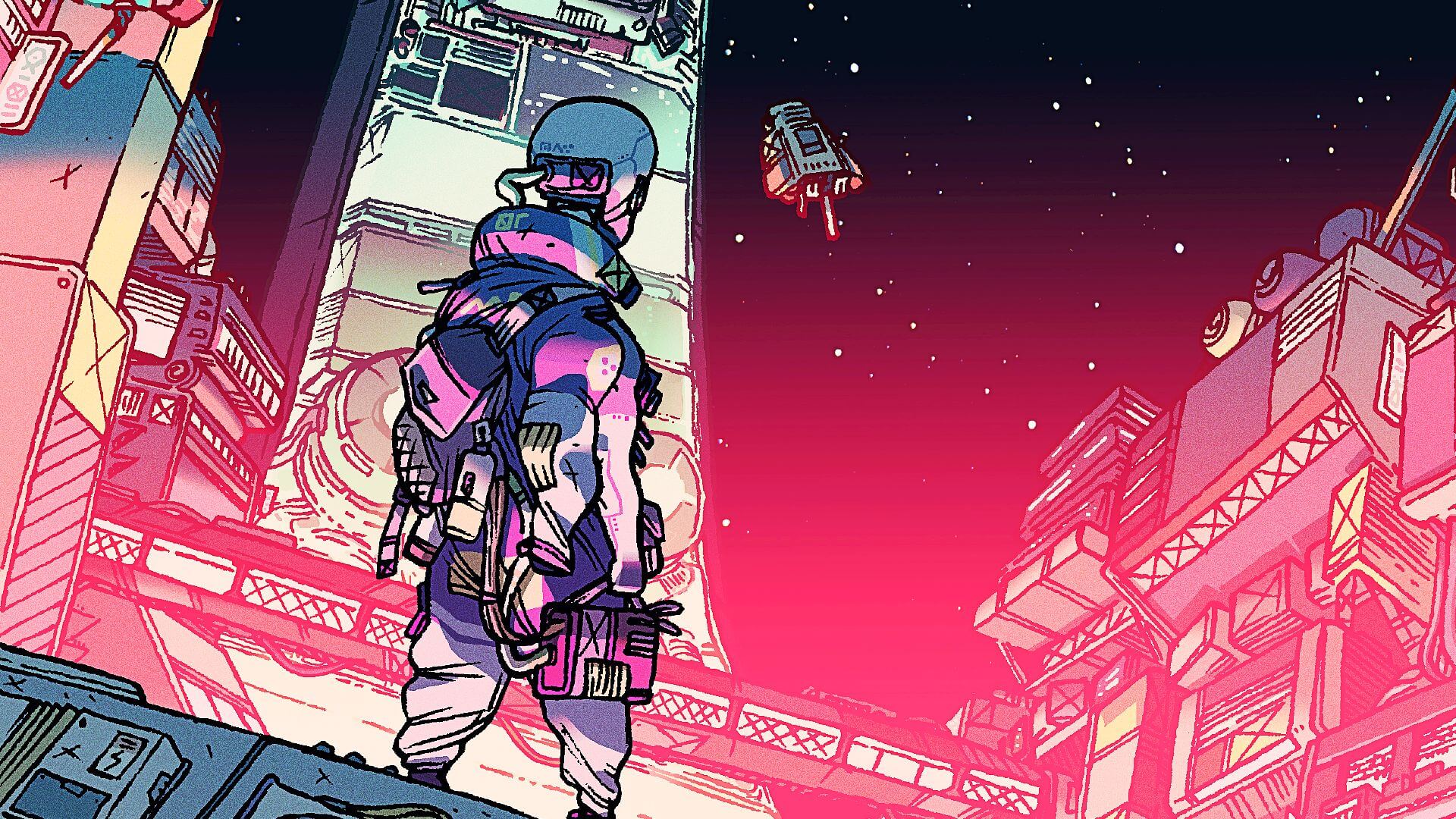
Citizen Sleeper succeeds through its connection, rather than complexity. There aren't wildly divergent stat progressions nor mind-blowing dialogue choices to make; instead, it meshes functional tabletop systems with genuine storytelling in a way that's tough to put down. It's surprising how a cluster of random dice rolls can feel so naturally incorporated that it eventually becomes second nature. It's not free of noticeable blemishes, but the superlative qualities across so many aspects ranks this as one of 2022's best surprises.
TechRaptor reviewed Citizen Sleeper on Xbox Series X with a copy provided by the publisher. It is also available on Xbox One, Nintendo Switch, and PC.
Review Summary
Pros
- Great World-Building
- Quality Prose
- Addictive Game Design
- Impressive Art Design
- Impressive Soundtrack
Cons
- Gameplay Loses Some Tension Towards The End
- Some Functionality Annoyances
- A Couple Storytelling Missteps
Have a tip, or want to point out something we missed? Leave a Comment or e-mail us at tips@techraptor.net






